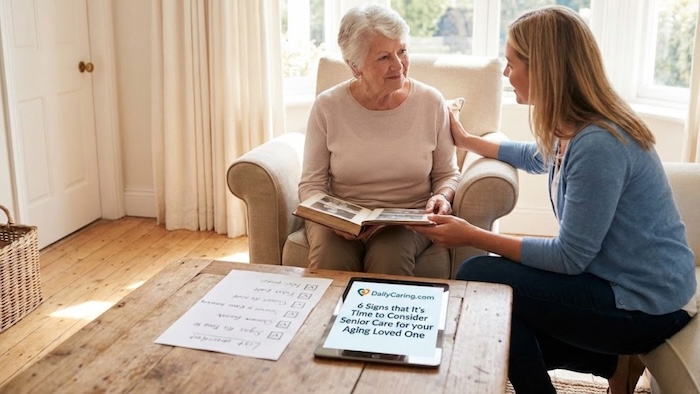Recovering from surgery can be challenging at any age. For older adults, the healing process often takes longer and carries additional risks.
With the proper preparation and care, you can make recovery safer, smoother, and less stressful for both you and your loved one.

Seven Caregiver Strategies for a Smoother Recovery
Caring for an older adult after surgery can feel overwhelming, especially when you’re trying to balance medical instructions, home adjustments, and their emotional needs.
The good news is that small, thoughtful steps can make a big difference in how smoothly recovery goes. These seven strategies are designed to help caregivers provide practical support, reduce risks, and create a more comfortable healing environment.
1. Create a list of items your loved one will need
Most people bring home new medications after surgery, but seniors may require additional items.
Wheelchairs, hospital beds, compression socks, and leg braces are just a few examples of what seniors may need during recovery.
Scrambling at the last minute to find and purchase these items can be stressful.
To reduce stress for both of you, talk with the nurses and doctors ahead of time and start making a list of items that will be needed upon your older adult’s return home.
Some medications can only be picked up at the pharmacy after hospital discharge, but you’ll be able to get most of the necessary items in advance.
2. Prepare the home for their return
For a smooth transition home, clean the house and re-arrange furniture to remove obstacles and hazards. This helps make their recovery as easy as possible.
Begin by clearing pathways and removing any throw rugs or other items that could cause a fall or slip. Place remote controls, phones, books, and other frequently-used items within easy reach.
If your older adult lives in a two-story home, consider placing their bed on the main level to avoid climbing stairs.
Anything you can do to make it easier to get around the house will benefit their recovery.
Lastly, stock the pantry with healthy, easy-to-prepare foods. Nutritious, easy-to-make meals will encourage eating and promote faster wound healing.
3. Make them as comfortable as possible
For seniors, recovery from major surgery can be a slow, frustrating process. To keep them as comfortable as possible during their return home, there are a few things you can do.
If they had knee, ankle, or leg surgery, their doctor may have instructed them to elevate their legs.
Be warned – although it seems simple, improperly elevating the legs can have adverse effects. A leg-elevation pillow helps keep the legs raised, promoting healing.
In addition to making them physically comfortable, don’t forget to offer emotional support.
Having surgery can trigger feelings of helplessness and sadness. Grabbing a few of their favorite things – like magazines, movies, or special food items that are doctor-approved – can boost their spirits.
4. Accompany them to follow-up appointments
Even if your older adult doesn’t have any memory problems, it can be beneficial to accompany them to follow-up doctor appointments.
As their caregiver, you may be able to provide details about their health and recovery that they may not remember immediately when the doctor asks questions.
Taking notes while the doctor is speaking also helps both you and your loved one remember the most important parts of the conversation.
If you have any questions, this is a good time to ask the doctor to ensure your older adult is receiving the best possible care.
5. Know their limitations
Doing too much too soon after surgery can cause a setback in their recovery.
The healing process is already slow for older bodies – the last thing you want is for them to do something that puts them back at square one.
The doctor should provide information on any post-operation restrictions. This may be difficult for some seniors to follow due to cognitive impairments or a stubbornly self-sufficient attitude.
Examples of surgical limitations:
- Cataract surgery: No bending forward, heavy lifting, or rubbing the eye.
- After hip or knee replacement: Avoid crossing legs, twisting, or sitting in low chairs to prevent dislocation.
- Abdominal surgery (like hernia repair): No heavy lifting, straining, or bending at the waist.
- Heart surgery (bypass or valve repair): Don’t push or pull with arms (like opening heavy doors), and avoid lifting objects heavier than 5-10 pounds.
- Spinal surgery: Limit bending, twisting, and lifting. Use adaptive tools (such as reachers) to pick up items.
- Hand or wrist surgery: Avoid gripping, squeezing, or weight-bearing until cleared by the surgeon.
If your older adult forgets their restrictions, gently remind them of the doctor’s instructions and offer to complete the task for them.
6. Be aware of hospital delirium
Even if your loved one doesn’t have dementia, they may become confused or disoriented after surgery. This condition, called post-operative delirium, is common among older adults and can appear suddenly.
Typical signs include:
- Trouble focusing or paying attention
- Fluctuating alertness (drowsy one moment, agitated the next)
- Hallucinations or seeing things that aren’t there
- Restlessness, pacing, or pulling at medical equipment
What caregivers can do:
- Inform the care team of the risk factors. If your loved one has experienced confusion during past hospital stays, make sure doctors and nurses are aware.
- Bring familiar items from home. A favorite blanket, family photo, hearing aids, or glasses can help reduce disorientation.
- Maintain a calm presence. Speak slowly, offer reassurance, and avoid arguing if they’re confused.
- Encourage natural rhythms. Help them stay oriented by opening blinds during the day, keeping lights dim at night, and limiting unnecessary noise.
- Stay alert for changes. If delirium develops, notify the doctor immediately so they can adjust medications, check for infections, or make other changes to improve recovery.
While delirium can take days, weeks, or even months to resolve fully, most cases are temporary. With patience, support, and medical guidance, your loved one can return to their normal level of awareness.
Quick Tips to Reduce Delirium Risk
- Keep hearing aids and glasses within reach
- Bring familiar items from home (photos, blanket)
- Encourage normal sleep/wake routines
- Limit background noise and unnecessary interruptions
- Stay calm and reassuring when confusion appears
7. Ask for help when you need it
If you’re caring for a parent, it’s normal to feel overwhelmed. If you feel yourself becoming stressed out and irritable, don’t be ashamed to ask for help.
Professional care workers are available to relieve some of the pressure by caring for your older adult while you take much-needed breaks.
This could mean hiring a home health aide or a registered nurse to provide in-home care. Or hiring an in-home caregiver to help with dressing, mobility, meals, companionship, and light housekeeping.
Taking care of yourself helps both you and your older adult. If you’re burned out, seniors will likely notice your irritability. That could make them feel guilty or angry, and potentially decrease their ability to heal.
Wrapping Up
Recovery takes time, especially for older adults. By preparing the home, supporting them physically and emotionally, and taking care of yourself too, you’ll help your loved one heal with greater comfort and confidence.
Recommended for you:
- This Hospital Discharge Checklist Prepares Seniors for Successful Recovery
- 4 Ways to Know If Seniors Need to Return to the Hospital
- 9 Ways to Make Hospital Visits Easier for Seniors with Dementia
Guest contributor: Dr. Chris Dickson is a board-certified vascular surgeon and Fellow of the American College of Surgeons. After observing that patients often adopted ineffective postures after surgery, he developed the Lounge Doctor Leg Rest to promote proper recovery positions. Dr. Dickson also recommends the Lounge Doctor for leg discomfort, venous problems, and even lower back pain.













